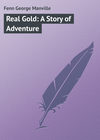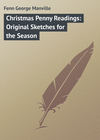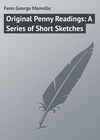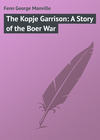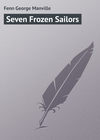Buch lesen: «Stan Lynn: A Boy's Adventures in China», Seite 11
“Tell them again.”
Wing spoke to the little crowd, and as he finished the coolies set up a tremendous shout.
“What do they say now?” cried Blunt.
“Say don’tee ca’e half mandalin button fo’ all pilate on livah.”
“Well done!” cried the manager. “What else?”
“Allee wantee fight velly bad. Knife all cuttee cuttee like lazo’. Wantee shave bad man head off.”
“Then they mean to stop and back me up?”
“Yes. Say kill plenty mo’e pilate. No habbee big fightee long time ago, and say Wing go in boatee all alonee and get out way.”
“Off with you then, my man,” cried Blunt; “they’re quite right. You’ll be in the way. – Well, do you hear?”
Wing nodded.
“Not go ’long till Misteh young Lynn quite leady.”
“But don’t you understand? Mr Lynn is going to stop and fight.”
“Yes. Wing stop take ca’e of um.”
“What!” cried Stan, laughing.
“Yes. Wing tellee old Lynn and Uncle Jeffley takee gleat ca’e young Lynn. How takee gleat ca’e if Wing lun away in boat? Wing go ’top along takee ca’e young Lynn.”
“No, no, Wing. You had better go and get out of danger,” said Stan warmly.
“Young Lynn talkee talkee big piecee nonsense stuff. Wing go back in boat Hai-Hai; Uncle Jeff say, ‘Hullo, you! What double dickens you do along young Lynn?’ What Wing say? ‘’Top topside house fightee fightee.’ Misteh Olivee say, ‘Why Wing not ’top topside house fight too, kill pilate, bling young Lynn quite safe?’ Misteh Olivee old Lynn quite light. Wing no go lun away in boat. Young Lynn come, Wing go. Young Lynn no go, Wing ’top along takee ca’e young Lynn.”
“Stop, then,” cried the manager abruptly, “and let’s see whether you can fight.”
“Yes,” said the Chinaman coolly enough. “’Top ’long young Lynn. Fight muchee. Kill plenty pilate.”
“There! we’ve all talked enough,” cried the manager, turning up his sleeves. “Now then for work. – You, Wing, go right up to the top of the big warehouse and watch the river. As soon as you see the tip of a junk-sail you’ll give us warning.”
“Misteh Blunt lendee Wing two-eye pull-out glass?”
“My double telescope? Yes, take it; and mind you let us know in time. – Now, Stan Lynn, we’ve got some man’s work to do. You can’t afford to be a boy any longer. This way. – Now, my lads, follow on. If the bloodthirsty wretches will only give us plenty of time they shall have such a reception as will open their diagonal slits of eyes.”
Five minutes later Wing was perched at the very top of the great warehouse, with his eyes glued to Blunt’s lorgnette, and his blue cotton frock filling out in the breeze and shrinking again in the most grotesque fashion. One minute the Chinaman was blown out like a man in the transition state of turning into a balloon. The next minute he was convex one side, concave the other, while directly after he seemed to have been furnished with an enormously huge bun upon his shoulders. But he noticed neither wind nor sunshine; his eyes were strained up the main reach of the river, and the glass was sweeping bend after bend in search of the coming danger in the shape of the top of some tall matting junk-sail seen across the country where the great river pursued its serpentine course.
Chapter Twenty
“Now then, Cartridges!”
There was an end to peaceful mercantile pursuits at the great warehouse and wharf, and all was hurry and bustle, but with little confusion, for Blunt had suddenly become military in his orders and issue of directions; while, full of excitement now, Stan dashed at the task in hand, proving himself a worthy lieutenant to the fighting manager. The men began busily handling boxes and bales, and at first sight it seemed as if they were preparing to load a trading-junk with the contents of the storehouse, so actively were they engaged in bearing out silk-bales and tea-chests; but the pleasant herb which cheers but does not inebriate was to be put to a very different purpose.
“You take that job in hand, Lynn,” cried Blunt, “and make the fellows plant the chests down right along the front, just as if you were building a wall of blocks of stone; but after the second row is placed, leave a loophole between every second and third chest so that we can fire through, while I set to work and make a breastwork with the silk-bales at every door and window. No bullets or shot that the enemy can fire will go through the soft, elastic silk. – Work away, my lads.”
Englishmen and Chinamen cheered together, and worked with might and main, every one feeling that it was a race against time, but growing lighter-hearted as they went on, the materials being so close at hand; and as they were brought down from above or taken from the huge stacks on the ground-floor, they were rapidly formed outside into a light but strong loopholed wall extending along the wharf and facing the sea. One easy enough to tear down, no doubt, if the enemy determinedly faced the storm of bullets poured upon them from the loopholes, but good enough to protect the defenders and keep the assailants in check for a time; while, when it began to yield, the besieged party had only to rush into the warehouse offices and dwelling, close and barricade the doors, to help to defend what formed the keep or stronghold of the mercantile fort, and continue the firing from behind the silk-bales advantageously placed as breastworks behind the first-floor windows, where they could fire down upon any of the pirates who tried to shelter themselves behind the tea-chest wall.
It was wonderful with what rapidity the wall and breastworks rose, while the Chinese carpenters, whose general work was the making of the chests, sawed and hammered away, barricading the lower windows, and placing planks ready for closing up the two doors that were left for temporary use.
“They’ll never get past the chest wall,” panted Stan excitedly as Blunt came down from where he had been showing his men how to wedge the silk-bales together so as to stand tightly in the windows.
“Don’t you be too sure, my boy,” said Blunt. “They are regular fiends, these half-wild Chinamen, and they’ll come swarming over the wall like monkeys.”
“And I thought it so strong that nothing but fire would have any effect upon it,” said Stan gloomily.
“Fire would have hardly any effect upon it,” said Blunt, “unless there was a strong wind. The chests might burn, but the tea would only smoulder away.”
“I am disappointed,” said Stan, wrinkling up his forehead.
“Not a bit. I’m delighted with what you have done. It is strong, but a party of our sappers and miners would laugh at it all and say it was as weak as so much cobweb.”
“But I say, if they come, how will they attack?”
“Like civilised savages: pour in a hail of swivel-gun balls, scrap-iron, and pebbles from the junks till they land, and then come on with spears, pitchforks, tridents, and swords. Some of them will have long jingals– matchlocks, you know – and no doubt muskets and rifles as well. Then, too, I dare say they will bring plenty of stink-pots to throw – earthen jars full of burning pitch. We shall have a high old time of it, Stan, my lad, as soon as the fight begins.”
“Oh!” exclaimed Stan suddenly, with a look of dismay.
“Hullo!” cried Blunt, looking at his companion in a peculiar way. “Beginning to think it will be too much of a good thing?”
“No-o-o-o!” cried Stan angrily. “That I wasn’t. I was thinking of the stink-pots.”
“Well, of course they’ll stink, as ’tis their nature to,” said Blunt merrily.
“Of course they will; but burning pitch – it will stick.”
“Pitch has a habit of doing so, my son,” said Blunt mockingly.
“Oh, you don’t see what I mean,” cried Stan excitedly. “The warehouse – wood – they’ll set the whole place on fire and burn us out.”
Phee-ew!
Blunt gave forth a long-drawn whistle.
“By Saint Jingo, the great fighting-man,” he cried, “I never thought of that Stan Lynn, you’re a regular Todleben – a prince of engineering defence. Why, of course! They’d roast us out, and it would hurt horribly, without reckoning how they would poke us back with their tridents to go on cooking if we tried to run away.”
“You see now, then?” said Stan.
“See? Yes. I can almost feel. I am glad you thought of that. All right. We’ll have half-a-dozen casks in the middle of the big office, and I’ll set a line of men to work across the wharf with buckets to fill the casks from the river.”
“So as to nip any little fire in the bud?” cried Stan eagerly.
“I don’t see how you can nip a fire in the bud,” said Blunt, with sham seriousness.
“Oh yes, you can,” cried Stan laughingly. “Nip it in the bud before it blossoms out into a big blaze.”
“Good boy, Stan! But the old people ought to have called you Solomon. Come on; let’s get the men at work filling the water-casks, and then we’ll serve out the firearms.”
In very few minutes the empty casks were in place, and two lines of coolies at work dipping water from the edge of the wharf, passing it from hand to hand along one line to where it was emptied into the open casks, and sending the empty buckets back along the other line to be refilled.
“Goes like clockwork,” said Stan as he watched the men.
“Thanks to you, my lad,” said Blunt. “Now then, let us consult the oracle.”
“Eh?” asked Stan.
“Old Wing,” replied Blunt; and stepping outside, he hailed the Chinaman where he was perched upon the extremity of one gable, using the glass most energetically.
“Ahoy, there! Hullo, Wing!” shouted the manager. “How many junks can you see, and how many pirates in each?”
“No see not one yet while,” cried Wing, lowering his glass. “Velly, velly long time coming.”
“And a good job too, my man. Have you looked right out yonder where the river bends round?”
“Yes; Wing look evelywheh. No junk come yet.”
“That’s right. Keep on looking out.”
“You think junk full o’ pilate come now?”
“Of course I do. Didn’t you say they were coming?”
“Yes. Wing think allee junk come long ago.”
“Which means he is getting very tired of sitting perched up there,” said Stan, laughing.
“Yes; and we’re getting very tired of working down here, but it has to be done,” responded Blunt. Then aloud: “Never mind what you expected, Wing; keep a sharp lookout all round, and don’t miss the enemy unless you want to have a sharp something round your neck, and your head off before you know it.”
“Yes, Wing look all alound. No wantee head choppee off by pilate man.”
“That’s right,” said Blunt, turning away. – “Well, we are getting into a good state of defence even now, and of course we are bound to have a couple of hours’ notice, unless the enemy make their attack in the dark.”
“In the dark?” said Stan, whom the idea quite appalled.
“Yes; they may wait till dark, and then drop down slowly with the stream. It will be bad for us if they do, but we must take things as they come; but I should like it to be daylight for our job.”
Stan felt ready to shiver, but he suppressed it.
“You see it is of no use to be nice about this bit of business, my lad,” said Blunt gravely. “There’ll be no compunction on the part of the enemy. They’ll come on with the intention of massacring us all, and they’ll do it if they can.”
“But they can’t,” said Stan hoarsely.
“They shan’t,” said Blunt; “for, as I said, it will be no time for being nice. We’ve got to kill every one of the wretches if we can.”
“For the benefit of humanity,” said Stan eagerly.
“I suppose so, my lad, but principally for the benefit of ourselves. We want to live out our time, and we’ll do it too, so we must shoot them when the game begins. There! don’t let us talk about what may be; the pirates haven’t arrived yet. All we’ve got to do is to be ready for them if they do come.”
“Then you think that perhaps, after all, they may not attack us?”
“No, I don’t,” said Blunt in the roughest manner. “I trust Wing – as far as one can trust a Chinaman – but it is always on the cards that the scare is not so bad as he made out. Now then, let’s see about the shooting-tackle.”
Blunt led the way quickly, and with a decision in his step that showed how much he was in earnest, to the portion of the warehouse set apart for the arms-rack, chest, and the magazine.
“This is the sort of thing your people at Hai-Hai ought to set up,” said Blunt. “I hinted at it when I was over there, but your father said so plainly that he preferred to trust to the police there that I said no more, only made up my mind that, as we have no police or protection of any kind here, I was quite right in being prepared for the worst. What do you say?”
“I hate the idea of using such things,” said Stan gravely, “but it must be right here.”
“Of course; and you won’t mind using a rifle?”
“I shall mind very much,” replied Stan, “but I’m going to use one.”
“That’s right. Here we are,” said Blunt, unlocking and raising the trap-door in the floor by its ring, and descending half-a-dozen steps into a bricked-in place with something resembling a wine-bin of three shelves on one side, in which were stacked a few boxes not unlike cases of wine.
“Here! let’s have them out at once,” said Blunt, and he handed up to his young companion case after case.
“Set them on that big table,” he said. “Mind be careful. I don’t know whether if one were dropped the cartridges would explode, but I shouldn’t like to try it. There you are; two cases for the rifles, and one for the revolvers. We’ll leave the rest here, with the key in ready if wanted. Now for the tools themselves.”
He stepped out, closed the trap, and turned to the arms-rack.
“You, Stan, take to the arms-chest and open it ready. I’ll serve out the rifles; you do the same with the revolvers. – Hi, you!” was shouted to one of the clerks busy helping to pass out more tea-chests for the continuation of the wall-building; “pass the word for the men to come for their rifles.”
The order was given, and as the men filed up each received a Martini-Henry, bandolier, and revolver, afterwards proceeding to the big table to wait till the weapons were supplied to all who needed them.
“There you are,” said Blunt as the last one was supplied. “Splendid new weapons that shoot perfectly straight if you hold them so. Now then, cartridges!”
Packets of large and small cartridges were handed to the men for rifle and revolver, several of them receiving instructions how to fit the little rolls of powder and lead into the clips of the bandoliers, before they marched out, ready for the great emergency, keeping their weapons with them now as they went on with their several duties of finishing the defences.
Chapter Twenty One
“Why, he’s Asleep!”
“The enemy do not come, Lynn,” said Blunt a short time later, when they had both filled their bandoliers and pistol-pouches.
“And a good thing too, for we’re hardly ready yet.”
“What! with our defences? Well, let’s take a good look round and see what more there is to be done.”
It was getting late in the afternoon, and the westering sun was pouring down its rays with a violence peculiar to a Chinese summer, though the winters are so intensely cold that the people go about with clothes piled upon clothes, so that a wealthy man often resembles an animated feather-bed, and in fact has his garments so quilted with feathers and down that if picked to pieces, though he might not furnish enough for a bed, he could respectably fill a bolster and pair of pillows. There was very little breeze, and Blunt and his companion were longing for that which would come in the evening.
“Only there’ll be a great drawback to it,” said Stan – “the darkness will come too.”
“Yes, the darkness will come too,” said Blunt thoughtfully, for his eyes were wandering over the tea-chest defence-wall inside which they were walking; “but,” he added in words which proved that his thoughts were not upon the darkness, “I don’t like that ending off. It’s weak.”
“What! where it turns round the end of the warehouse?” replied Stan. “Yes; the enemy might make for that corner and come round.”
“And attack us in the flank, as soldiers would say,” exclaimed Blunt. “It won’t do. – Here, three or four of you, get some more tea-chests out and build this end up higher. There ought to be quite a dwarf tower here.”
“No more chests, sir,” said the clerk addressed. “We’ve used them all as far as they’d go.”
“Then use bales. Call up a dozen coolies, and build up a rounded corner as quickly as you can.”
“Yes, sir,” was the eager response, and the man addressed trotted off, followed by his comrades.
“Odd that we shouldn’t have noticed that before. The corner at the other end is strong, and I meant in my hurried mental plans for this to be like it. Stopped, of course, by the material running out. Our weak spot, Lynn; and they say a chain is only as strong as its weakest link. Our chain of defences – eh?”
“I hope we shall not find any more weak points,” replied Stan.
“Then we had better not look round any farther, my lad, for in this hasty knocking up of our defences we shall find plenty.”
“Let’s know the worst,” said the lad warmly. “Yes; we’ll have no falser confidence,” replied Blunt; and they continued their inspection of the ground-floor with its two doors and the ample material ready for barricading them if the defenders were driven in. Then they ascended to the first floor, after standing aside for a few minutes to allow the bearers of the bales to pass along with their loads ready for making the little extemporised bastion at the end.
But they found no weak places upstairs. Every window had its protecting breastwork where a man could use his rifle in comparative safety and well cover the spots likely to be attacked.
“Capital,” said Blunt; “far better than I expected. If the enemy do come, all I can say is that they will be mad to attack us, for they must leave scores of their party shot down before they could carry our outer wall. Now then, we’ll go down and see how the corner is getting on; then hail Wing, and if he has nothing to report, we’ll call the men together for a good hearty meal, and over it I’ll tell off the different stations they are to occupy.”
“What are you going to do about giving orders when the firing begins?” said Stan. “There’ll be the noise of the guns and shouting.”
“This,” said Blunt, taking a large silver whistle from his pocket. “I shall explain that when this whistle is blown all are to run towards the place from which the sound comes, so as to command plenty of strength in hardly-pressed places. Two shrill whistles mean, make for the upper windows.”
“Retreat?”
“Yes.”
“And what about barricading the two doors?”
“I shall station the two carpenters and four men at those doors, ready to close them up when necessary. Tut, tut, tut!”
“What’s the matter?” said Stan, startled by his companion’s ejaculations.
“In the hurry and excitement I haven’t found time to say a few words to the Chinamen about fighting for us. Never mind; I’ll have a few words with them over the supper, dinner, or whatever it is.”
They passed down and went outside on to the wharf, where, before inspecting the addition to their defences, they both looked up, and Blunt hailed Wing, who was still seated astride the gable, shading his eyes from the ardent sun and slowly sweeping the horizon.
“Well, Wing,” cried Blunt; “see anything of the enemy?”
“No. Not come yet. Velly long time.”
“And a good job, too,” said Blunt to his companion, who, after another good look at the patient figure in the blue frock, crouching all of a heap and looking like a very amateurish beginner astride of a huge razor-backed horse, said:
“Don’t let us forget to send the poor fellow up some tea and bread-cake. He must be half-famished.”
“So must everybody be,” said Blunt. “I know I am. Here, how are you getting on, my lads?” he continued, turning to the working party.
“I think we’ve got on as far as we can, sir,” replied the clerk. “I was hoping that you’d come soon and tell us what more to do. We’ve packed in nearly fifty bales, as you see.”
Blunt inspected the work in silence, with its double wall loopholed, and with extra shelters for the men who would be firing therefrom, and finally stood thinking.
“Well,” he said to the men who were watching him anxiously, “I can suggest nothing more. You have done your work admirably. So now knock off and come into the big store-room for refreshments.”
The men cheered and followed into the great place, which, minus its piles of tea-chests carried out to build the wall, looked vast; but the trestle and boards spread ready, and pretty well covered with a substantial tea by Blunt’s Chinese servants, made the place look welcome in the extreme; and upon the men being bidden to fall to, Europeans and Asiatics set to work eagerly, talking, laughing, eating, and drinking, and more resembling a strange picnic party than a number of men expecting to be engaged at any hour in a desperate fight for their lives against a savage foe.
There were only two of those present who looked moody and were silent. These were Blunt and Stan, the former washing down his food with draughts of tea as with frowning brow he cogitated over his plans; the latter, now that the excitement of preparation was over, feeling a strange sense of sinking which the bread and tea did not remove. He wanted to preserve his firmness and show Blunt that he was no coward, but there was what seemed to be a dark mental cloud ahead, and in spite of every attempt to pierce it, there it hung ominously like a portent of what was to come, and as if fate was kindly hiding from him the horrors in store.
Stan set his teeth hard and made a tremendous effort at last.
“I must eat,” he said to himself, “or I shall be as weak as a child, and I must drink to quench this horrible feeling of delirious thirst. Oh, I wish I wasn’t such a weak coward! I’m sure no other fellows of my age can be like me.”
Forcing himself then, he began to eat and drink hurriedly, all the while recalling old school fights into which he had entered with fear and trembling, but without recalling how he had come out.
Then all that he had read of Chinese horrors, and the indifference of these people to life, came floating before his eyes – anecdotes that he had read of their atrocities and savage treatment of their enemies – there they all were, till, instead of seeing any longer that black, cloud-like curtain, the lad now seemed to be seeing red, and he started violently when his companion brought him to himself by suddenly rising and blowing his silver whistle. Then in the silence that immediately ensued Blunt explained his plans to his listeners, and had his words well interpreted to such of the Chinese workers as were not perfect in their knowledge of English.
Blunt spoke briefly, but every word of his instructions was to the point, and the listeners rose from their rough benches at last well drilled in their duties as to the places they were to occupy, the Europeans finding a leader to reply and declare how to a man they would fight to the death; while, when the manager had done, the head of the Chinamen rose and declared that his comrades thoroughly hated all pirates and murderers, and that to a man they too would fight for the good, just master who always behaved to his men as if he were their father.
Blunt smiled and nodded, and then said a few words to the leader about his comrades having rifles. But these were declined, the Chinaman declaring that he and his fellows could do more good with their long knives and hatchets when the enemy came to close quarters; and this he said, as Stan noticed, with a fierce glow in his eyes which proclaimed that, in spite of the speaker being as a rule a mild-spoken, peaceful carpenter, there was Chinese Asiatic savage instinct beneath the skin – showing, too, that he and his fellows were going to prove themselves dangerous foes to the bloodthirsty enemy when they approached.
“Then now we all understand each other,” said Blunt sternly. “I have only this more to say – that as soon as it is dark three parts of you will lie down to sleep. I shall place sentries to give the alarm if the enemy come on in the night. Then every man will run to his post, and Heaven help us all to do our best!”
A tremendous cheer greeted the close of Blunt’s speech, and after giving all present a sharp gratified look, with a nod of the head, Blunt turned to his young companion.
“Come along,” he said. “You and I will go and order poor Wing down, and keep a lookout from the little bastion while he comes and has his tea.”
“Yes, quick!” said Stan; “my conscience has been smiting me all the time you were talking, but of course I could say nothing then.”
“Of course not I had quite forgotten him. I had so much else to think about. Now then, take your rifle. Here’s mine. We must make these our companions now.”
Stan obeyed the order he had received, following his companion’s example as Blunt took his rifle from the corner where he had placed it; and together they stepped out into the shelter behind the wall, then climbed over on to the wharf, looked at the broad, clear river, bright in the evening glow, but with nothing visible to mar its peaceful beauty, and then as they reached the end of the wall —
“We shall have no enemy to-night,” said Blunt.
“Why do you say that?”
“Because we can see for miles, and there is not a sign of danger. They will not surprise us; they want daylight for their attack. – Ahoy, there! Wing! See anything?”
There was no reply.
“Look at that,” said Blunt, smiling. “Nice sort of a sentry that!”
“Why, he’s asleep!” whispered Stan.
Asleep the poor fellow was, and no wonder. Duty to his employers had a strong hold, but nature and exhaustion, after hours of baking and fasting upon the roof with straining eyes, were stronger; and but a very short time before the appearance of his European masters, Wing’s head, in spite of a desperate struggle to keep it firm, had begun to nod, then to make long, slow, graceful bows at the western sky, till at last, as if the strain upon his eyes in watching had affected the poor fellow’s brain with an uncontrollable drowsiness, his head went right down, to rest between his knees. There he crouched as if in a saddle; and then he was motionless, and looking wonderfully like a beautifully carved finial placed by a cunning builder as an ornament to the great gable-end.
“Poor beggar! It was too bad to leave him so long,” said Blunt. “I suppose I mustn’t bully him. But suppose the enemy had been coming down the river and had surprised us.”
“We should have been to blame for not having more sentries on the lookout.”
“Right, my young Solon,” said Blunt; “but it would have been a startler for him, and a lesson too, if he had been woke up by a shot.”
“Yes, that’s right,” said Stan, smiling at a thought which flashed across his brain.
“What are you laughing at?” said Blunt sharply. “I was thinking how it would make him jump if I fired a shot now.”
“Ah, to be sure! Slip a cartridge into your rifle and fire in the air.”
“I am loaded,” said Stan, who began to repent of his words.
“Of course. Fire away.”
“No, no; it would be too bad.”
“Fire – away!” said Blunt in a stern, angry tone; and feeling at once the impulse to obey, the lad held his rifle up pistol-wise at arm’s-length, drew the trigger, and then, as the report rang out, winced at the kick the piece gave, and as the smoke rose, stared in horror at the result of his shot.











